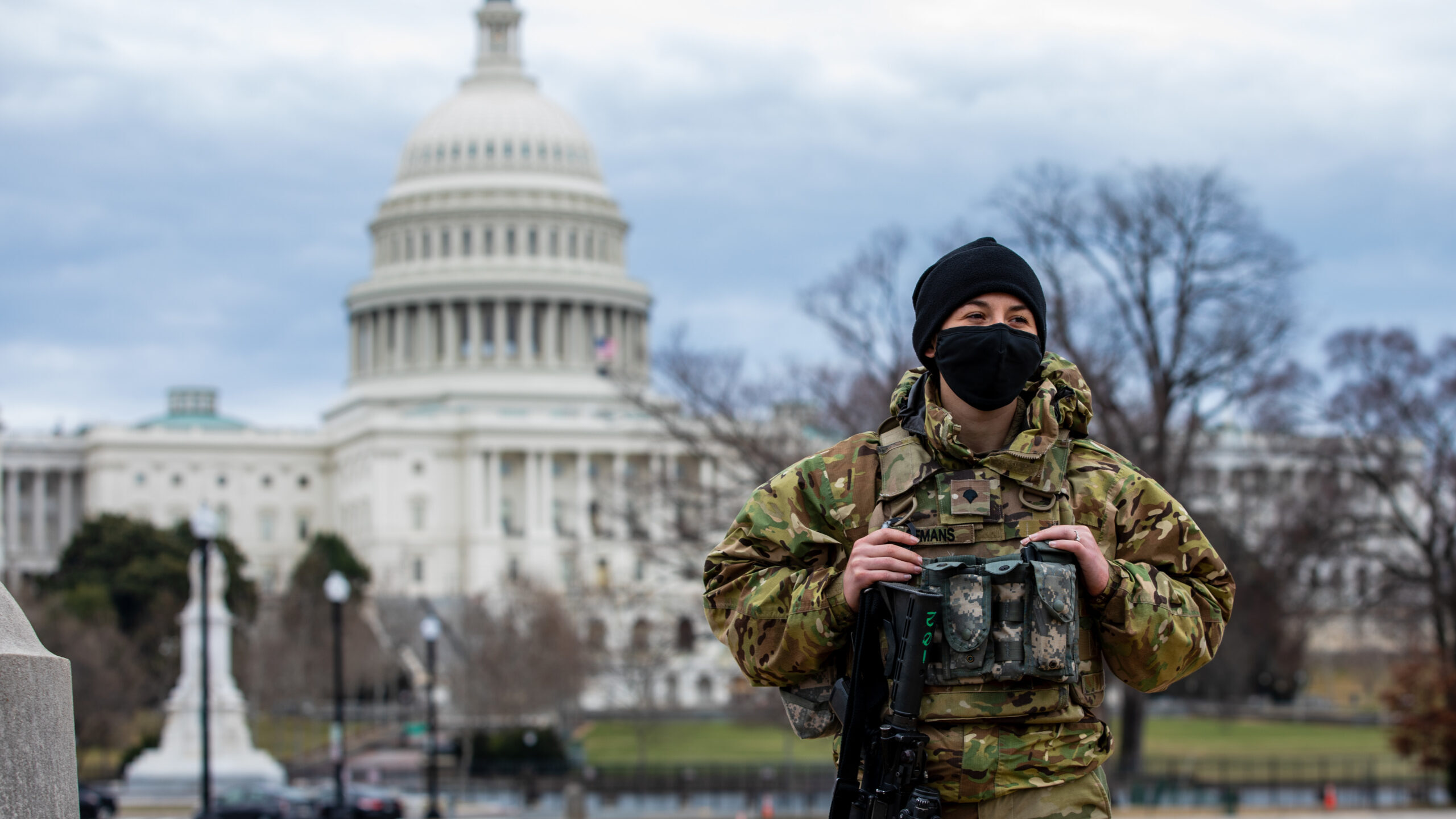
U.S
Army
Spc.
Breyana
Semans,
a
military
police
officer
with
the
46th
Military
Police
Company,
Michigan
National
Guard,
secures
an
area
near
the
U.S.
Capitol
in
Washington,
March
1,
2021.
(U.S.
Army
National
Guard
photo
by
Sgt.
1st
Class
R.J.
Lannom
Jr.)
WASHINGTON
—
The
House
passed
the
$884
billion
National
Defense
Authorization
Act
for
fiscal
2025
today,
despite
a
sizable
Democrat
contingent
opposing
the
typically
bipartisan
measure
due
to
the
last
minute-inclusion
of
a
transgender
care
ban.
The
bill
was
voted
through
281-140,
with
124
Democrats
and
16
Republicans
voting
against
the
measure.
The
compromise
NDAA
keeps
to
the
budgetary
spending
caps
imposed
by
last
year’s
debt
ceiling
deal,
which
set
a
$895
billion
limit
for
all
national
defense
related
spending
for
FY25.
Some
of
that
spending
is
not
covered
in
the
jurisdiction
of
the
NDAA.
The
focal
point
of
this
year’s
bill
is
a
14.5
percent
pay
raise
for
junior
enlisted
servicemembers
and
4.5
percent
raise
for
all
servicemembers,
as
well
as
a
laundry
list
of
provisions
intended
to
improve
troop’s
quality
of
life
—
a
political
slam
dunk
for
both
sides.
However,
Democrats
were
infuriated
by
a
last
minute
addition
of
language
by
House
Speaker
Mike
Johnson
that
would
ban
Tricare
from
covering
gender
dysphoria
treatments
“that
could
result
in
sterilization”
for
transgender
children
of
servicemembers.
The
House
Armed
Services
Committee’s
top
Democrat,
Washington
Rep.
Adam
Smith,
announced
on
Tuesday
that
he
would
vote
against
the
bill
despite
having
helped
helm
it,
due
to
the
anti-transgender
provisions.
During
a
Saturday
interview
with
Breaking
Defense,
Smith
said
he
would
have
been
in
favor
of
adding
language
to
study
the
effects
of
medical
treatment
for
transgender
minors,
but
that
“it
is
not
debatable
that
there
are
some
minors
with
gender
dysphoria
who
benefit
from
the
treatments
that
this
bill
would
ban.”
“You
are
denying
health
care
to
the
children
of
service
members
that
they
need
to
serve
a
partisan
agenda.
And
I
think
that’s
extraordinarily
problematic,”
he
said.
For
a
larger
rundown
of
the
bill’s
funding
recommendations
and
policy
mandates,
read
this:
What
to
know
about
what’s
in
the
compromise
NDAA
During
a
press
conference
earlier
today,
House
Minority
Leader
Hakeem
Jeffries
said
he
had
not
taken
an
official
position
on
the
NDAA
and
would
leave
it
for
each
member
to
make
their
own
decision
on
a
case-by-case
basis.
In
floor
speeches
ahead
of
the
bill’s
passage,
most
senior
HASC
Democrats
expressed
support
for
the
bill.
HASC
Chairman
Mike
Rogers,
R-Ala.,
told
The
Hill
on
Tuesday
that
Johnson
did
not
consult
him
about
including
the
care
ban.
Although
Rogers
said
he
agreed
with
the
substance
of
the
language,
he
sees
the
addition
of
the
provisions
as
unnecessary
due
to
the
election
of
President
Donald
Trump.
“My
preference
would
have
been
that
we
just
let
the
president,
on
Jan.
20,
deal
with
these
[culture
issues],”
Rogers
said,
“which
he’s
already
indicated
he’s
going
to
do.”
But
in
remarks
ahead
of
the
vote,
Rogers
said
that
the
bill
represents
a
“bicameral
compromise”
and
that
“each
corner
has
some
wins
and
some
losses.”
The
Republican-controlled
Rules
Committee,
which
set
the
terms
of
the
bill’s
passage
on
Monday,
voted
against
bringing
an
amendment
to
the
floor
that
would
have
allowed
members
to
reverse
the
transgender
care
ban,
as
well
as
another
amendment
that
would
have
given
governors
greater
control
over
the
transition
of
National
Guard
units
to
the
Space
Force.
The
bill
authorizes
$883.7
billion
for
fiscal
year
2025,
including
$849.9
billion
for
Department
of
Defense
programs.
It
also
approves
$33.3
billion
for
national
security
programs
in
the
Department
of
Energy
and
the
Defense
Nuclear
Facilities
Safety
Board
and
$512.4
million
for
defense-related
activities.
The
bill
now
heads
to
the
Senate,
where
it
is
expected
to
pass
despite
some
Democrats’
concerns
about
the
transgender
care
provisions,
as
well
as
disappointment
from
some
top
GOP
defense
hawks
who
had
hoped
the
Senate’s
version
of
the
bill
—
which
lifted
the
NDAA
topline
to
$911.8
billion,
pushing
overall
national
defense
spending
to
$923.3
billion
—
would
ultimately
prevail.
“The
failure
to
include
a
topline
increase
is
a
tremendous
loss
for
our national defense,”
said
Mississippi
Sen.
Roger
Wicker,
the
top
Republican
on
the
Senate
Armed
Services
Committee
who
is
in
line
to
take
the
gavel
in
January.
“Many
senior
flag
officers,
defense
strategists,
and
other
experts
continue
to
note
that
this
is
the
most
dangerous
moment
since
World
War
II,”
he
said
in
a
statement
Monday.
“Not
only
does
this
NDAA
thwart
the
bipartisan
will
of
the
Senate,
but
it
signifies
a
profound
missed
opportunity
to
strengthen
President-elect
Trump’s
hand
when
he
takes
office.”

